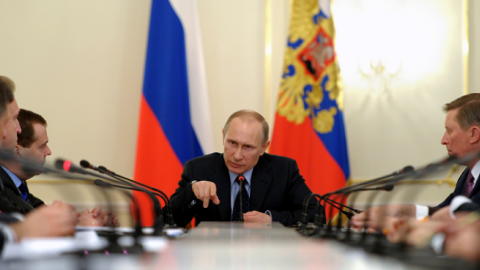If Russia's Ukraine gambit works, an emboldened Vladimir Putin may be tempted to take on the NATO alliance directly. How? By claiming danger to ethnic Russians in one of the Baltic states and intervening to protect them. President Obama's challenge is to head off the possibility of such a challenge, one that could lead to war in Europe.
The stakes in Ukraine, President Putin's motives and the region's anxieties are rooted in history that Americans tend not to know. For those who lived in the Soviet empire, however, it is history that hasn't been forgotten. It shadows today's events and wracks the nerves of those who knew Soviet domination.
In 1917, during World War I, revolutionaries overthrew Czar Nicholas II, and the Bolsheviks soon took control of the revolution. A civil war then raged for several years between the revolutionary Reds and the monarchist Whites. Ukraine took advantage of the upheaval to declare independence. Azerbaijan, Armenia and other parts of the Russian empire, singly and in groups, did likewise.
The Bolsheviks wanted to change Russia's government and rename the country, but they didn't want Russia to lose its empire. When they defeated the Whites and consolidated power, the Bolsheviks forced the split-away states to reincorporate into the empire, newly dubbed the Union of Soviet Socialist Republics. Westerners in general may be unaware of the short-lived independence of those Russian imperial lands in that time of civil war, but the people in those lands know the story well.
That's why the break-up of the Soviet Union occurred as it did. When Boris Yeltsin, the head of the U.S.S.R.'s Russian republic, declared Russia's independence in 1991, he did so in an agreement with the heads of the U.S.S.R.'s Ukrainian and Belorussian republics. Signed on Dec. 8 of that year, the Minsk accord specified that the U.S.S.R. "as a subject of international law and geopolitical reality no longer exists." It was important for Ukraine and Belarus that Russia formally renounced any claims to Soviet territory outside Russia.
President Putin, however, scoffs at legal niceties. Like the formidable Bolshevik Vladimir Lenin, Mr. Putin seems determined to reconstitute the Russian empire. In an April 2005 speech in Russia, Mr. Putin said that "the demise of the Soviet Union was the greatest geopolitical catastrophe of the century"—a century, it bears noting, rife with catastrophe, especially for the Soviets. Mr. Putin added that the U.S.S.R.'s disintegration was a "genuine tragedy" for the Russian people in that "tens of millions of our fellow citizens and countrymen found themselves beyond the fringes of Russian territory."
In 2008, Mr. Putin ran an experiment regarding Georgia and found he could invade and seize some of its territory without substantial cost. Now in Ukraine he is using Russian troops in an even bolder challenge to the post-Soviet order.
President Putin's hammer blow in Crimea reverberates throughout the former U.S.S.R. and in Eastern Europe. He is testing the resolve of a Western world that appears short on that quality. Russia lacks various objective attributes of a great power. Its population is shrinking, its economy is small, and its exports are mainly oil and gas. But Mr. Putin acts as though he runs a great power. He appears intent on cowing his neighbors and their friends.
Western leaders have insisted for years that the Cold War is over and that they have no interest in reviving it. Mr. Putin demurs. Leon Trotsky, another formidable Bolshevik, is said to have warned that, while you may not be interested in war, war is interested in you. President Putin seems to be telling us that the Cold War isn't over, despite our lack of interest. He may succeed in cracking Ukraine, or taking control over it altogether.
Then he would be free to decide what to do for his next amazing feat. Presumably, President Obama is pondering Mr. Putin's possible next moves, not just in Ukraine, but beyond. There is some danger of the Russian leader's lunging for NATO's jugular. He objected when NATO expanded eastward and embraced former Warsaw Pact members in Eastern Europe in 1999. But it was an infuriating humiliation in 2004 when Estonia, Latvia and Lithuania—former republics of the U.S.S.R.—became NATO allies.
Western officials may persuade themselves that they have no good options in Ukraine—that they cannot counter Russia there or even impose consequential penalties. If they do so persuade themselves, might they not come to the same conclusion even if Mr. Putin's next target is one of the Baltic states? The Russian leader could perceive a rare opportunity to wreck NATO.
With a victory in Ukraine under his belt, Mr. Putin might manufacture grounds for a Russian military intervention to protect the ethnic Russians in Latvia. They could be for him what Czechoslovakia's Sudeten Germans were for Hitler in 1938: a pretext for aggression. If Mr. Putin thinks NATO is bluffing when it says it will defend the Baltic states, he may call that bluff. If he's right, he could destroy NATO without war, the very alliance that destroyed the Soviet Union without war. Nice.
But President Putin may miscalculate in thinking that the NATO allies, because they didn't fight for Ukraine, won't fight for Latvia. Those allies may defend Latvia precisely because it's a formal member of the alliance. It's not in NATO's interest that Mr. Putin would misinterpret their indifference to his Ukraine incursion and make such a mistake.
Will President Obama and other NATO leaders find ways to impose significant costs on Russia for aggression in Ukraine? Will they shore up NATO's credibility regarding the sovereignty of the Baltic states and the former Warsaw Pact countries? Staying home from the next G-8 economic meeting, planned for Sochi in June, won't suffice. The stakes are huge and extend far beyond Ukraine.














